09:45-10:00 |
Opening Remarks
Keisuke Fujii
|
|---|
10:00-10:30 |
Koujin Takeda
"TBA"
|
|---|
10:30-11:00 |
Yuki Tokunaga
"Error- and Loss-Tolerances of Surface Codes with General Lattice Structures"
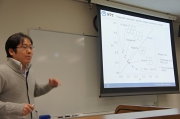 We propose a family of surface codes with general lattice structures, where the error tolerances against bitand phase errors can be controlled asymmetrically by changing the underlying lattice geometries. The surface codes on various lattices are found to be efficient in the sense that their threshold values universally approach the quantum Gilbert-Varshamov bound. We find that the error tolerance of the surface codes depends on the connectivity of the underlying lattices; the error chains on a lattice of lower connectivity are easier to correct. On the other hand, the loss tolerance of the surface codes exhibits an opposite behavior; the logical information on a lattice of higher connectivity has more robustness against qubit loss. As a result, we come upon a fundamental trade-off between error and loss tolerances in the family of surface codes with different lattice geometries. We also provide the physical aspects of the present results from the viewpoint of statistical physics, which leads to an equality that captures well both the error and loss tolerances of these surface cod
|
|---|
11:00-11:30 |
Shota Nagayama
"TBA"
|
|---|
11:30-12:00 |
Ryozi Miyazaki
"Enigmatic relationship between frustration and a transition point in the Ising spin glass"
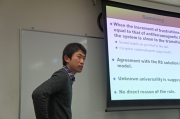 Discovery of an interesting relationship between frustration and the transition point at zero temperature in the Ising spin glass is reported. We observe the change of the average of frustration in the spin glass models when the average of the number of antiferromagnetic bonds is increased. We then discover that when the increment of the average of the number of frustrated plaquettes is equal to that of antiferromagnetic bonds, the location of the system in the phase diagram is in good agreement with the transition point at zero temperature numerically estimated by other approaches.
|
|---|
12:00-14:00 |
Lunch
|
|---|
14:00-14:30 |
Nobu C Shirai
"Statistical enumeration of self-avoiding polygons on a torus"
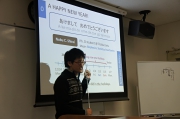 Recently, we developed a statistical enumeration method for self-avoiding walks (SAW) using a powerful sampling technique called the multicanonical Monte Carlo method. In the developed method, we estimate numbers of finite-step SAWs from simulation of the Domb-Joyce model, which is one of the statistical mechanical models. Adding some spatial restrictions to the simulation, we can also estimate numbers of self-avoiding polygons (SAP) on a torus, which give us the accuracy threshold of quantum error correction by the surface code on a torus. I will show a preliminary result of statistical enumeration of SAP on a torus and also show one way of studying quantum information via statistical mechanics.
|
|---|
14:30-15:00 |
Chihiro Nakajima
"Prime factorization of integers with advanced stochastic algorithm on classical computer"
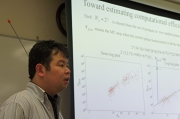 We propose a formulation of the problem of prime factorization of integers as a ground state searching problem. We would like to discuss about computational complexity of the prime factorization problem with advanced stochastic algorithms on classical computers
|
|---|
15:00-15:30 |
Akira Matsuo
"Quantum computational complexity of approximating partition functions of Ising model with complex parameters"
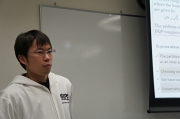 Calculating partition functions of classical spin models is computationally hard in general. Recently, it has been discovered that the partition functions of classical spin models can be expressed by inner products of quantum states. Based on the relationship, we show that a problem of approximating the partition functions of a class of the Ising model with complex couplings and magnetic field is BQP-complet
|
|---|
15:30-16:00 |
Coffee break
|
|---|
16:00-17:00 |
Hector Bombin
"Self-Correcting Quantum Computers"
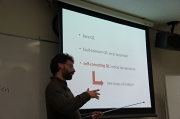 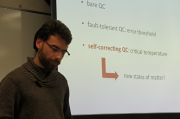 Is the notion of a quantum computer resilient to thermal noise unphysical? We address this question from a constructive perspective and show that certain local quantum Hamiltonian models can be used as self-correcting quantum computers, at least for a sufficiently high number of spatial dimensions. The models that we consider provide self-correcting quantum memories at finite temperature due to the confinement of the excitations. But in addition they allow the transversal and local implementation of a universal set of operations (in seven spatial dimensions). We give a procedure to initialize such quantum memories at finite temperature.
|
|---|
17:00-17:30 |
Yoshifumi Nakata
"Measurement-Based Quantum Computation on Symmetry Breaking Thermal States on a 2D square lattice"
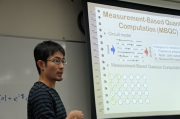 We address a question whether or not cooperative phenomena in many-body systems can be exploited for improving the reliability of measurement-based quantum computation (MBQC). We introduce a Hamiltonian on a square lattice, called an interacting cluster Hamiltonian (iCH), where the ground state is a cluster state and it undergoes a phase transition. We provide an intuitive picture for the improvement of the reliability of MBQC due to cooperative phenomena below the critical temperature and then, show the improvement in terms of the gate fidelities
|
|---|
17:30-18:00 |
Keisuke Fujii
"Topologically Protected Measurement-Based Quantum Computation on Symmetry Breaking Thermal States"
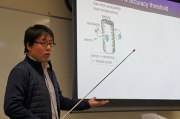 We consider topologically protected measurement-based quantum computation (MBQC) on thermal states of the interacting cluster Hamiltonian containing interactions between the cluster stabilizers that undergoes thermal phase transitions. We show that the long-range order of the symmetry breaking thermal states below a critical temperature drastically enhance the robustness of MBQC against thermal excitations. Specifically, we prove that MBQC is topologically protected below the critical temperature in three-dimensional cases.
|
|---|
18:00-18:15 |
Concluding Remarks
Masayuki Ohzeki
|
|---|

